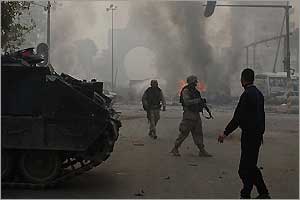|
 The
blast, apparently caused by a suicide bomber, occurred
at about 8 a.m. near the "Assassin's Gate"
to Saddam Hussein's former Republican Palace complex,
now used by the U.S.-led occupation authority for headquarters.
The gate is used by hundreds of Iraqis employed by the Coalition
Provisional Authority, the formal name of the U.S.-led
occupation authorities, as well as U.S. military vehicles. The
blast, apparently caused by a suicide bomber, occurred
at about 8 a.m. near the "Assassin's Gate"
to Saddam Hussein's former Republican Palace complex,
now used by the U.S.-led occupation authority for headquarters.
The gate is used by hundreds of Iraqis employed by the Coalition
Provisional Authority, the formal name of the U.S.-led
occupation authorities, as well as U.S. military vehicles.
The 18 dead included
16 Iraqi civilians and two American civilians, the U.S.
military press office said. The wounded included 22
Iraqi civilians, four American civilians and two U.S.
soldiers, the press office said.
Brig. Gen. Mark
Hertling, deputy commander of the 1st Armored Division,
said the blast was caused by a car bomb, and American
officials were "assuming this was a suicide
bomb." Witnesses said the blast occurred as one,
possibly two, Land Cruisers approached the heavily
guarded gate.
"It was
literally at the last point a vehicle could get to
without being stopped," Hertling said. "The
barriers absorbed most of the blast."
Police Gen. Hassan
al-Obeidi said the blast was caused by a lone suicide
driver.
A witness, Salah
Farhan, said he was accompanying colleagues through the
checkpoint when he saw a Land Cruiser try to cut to the
head of the line. The vehicle exploded about two cars
back from the gate, he said.
U.S. troops guarding
the gate took cover when they saw the vehicle try to
move to the front of the line.
The area is one of
the most heavily guarded in the capital. U.S. soldiers
guarding the gate usually stand about 20 yards from the
road behind coils of barbed wire and concrete barriers.
One witness, Hamid
Hawwam, said two cars exploded at the gate, and one of
them flew into the air.
Another, Haidar
Hanoun, said he was lining up for a job when a Land
Cruiser and another vehicle exploded.
"It was very
strong. There are a lot of injured and dead," he
said.
Karar Abbas, an
Iraqi civil defense trooper, said the blast engulfed
seven cars parked along the street.
Mohammed Jabbar, who
works at the Ministry of Planning, said he was waiting
to pass through the security checkpoint when the blast
occurred.
"When the
explosion went off, it was very strong," he said.
"It lifted us into the air. People fell on top of
one another."
At least three
separate fires were seen after the blast. One man was
seen lying motionless on the side of the road as
coalition soldiers and civilians helped the wounded.
Coalition tanks also
moved in near the blazes.
"The wounded
are in big numbers, there are killed, there were people
whom we couldn't take to the hospital," engineer
Khalid Taleb said. "It is a very crowded
area."
Several of the
wounded squatted helplessly on the ground. Some, shocked
and weeping, were comforted by bystanders. One wounded
man was carried away in what looked like a bed sheet.
Nabil Abdul Zahar
said a friend standing with him in line for security
checks was killed.
"My friend was
standing behind me in the line when the explosion
happened," a shaken Zahar said. "There were
lots of injured. I called for help and no one came to
help me. He died right there on the ground."
Iraqi police
announced on loudspeakers that coalition forces will
give $2,500 to anyone providing information on the
perpetrators.
The explosion could
be heard along the banks of the Tigris River, which
flows through the center of the city of 5 million. Dense
morning fog blanketed the city at the time.
The last large
explosions in the center of Baghdad occurred Monday when
mortars exploded near the river.
|